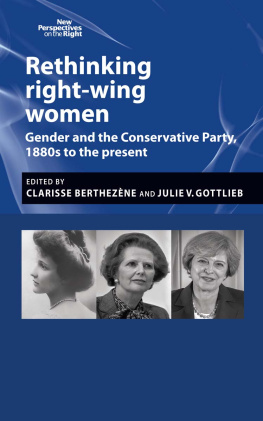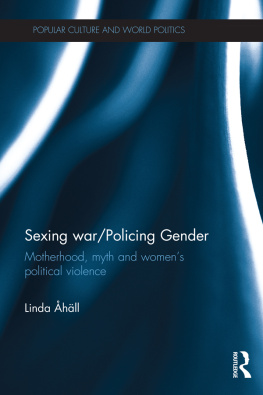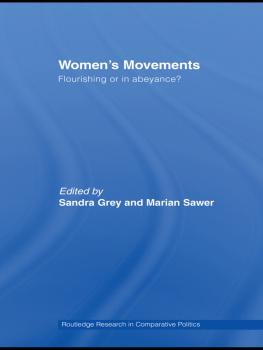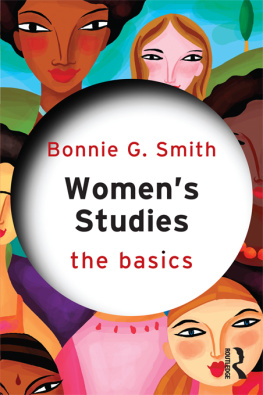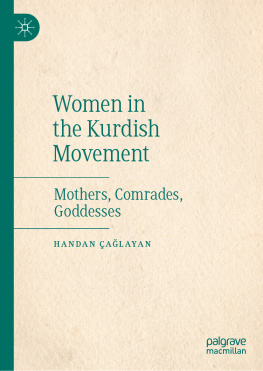A GERMAN WOMENS MOVEMENT
1995 The University of North Carolina Press
All rights reserved
Manufactured in the United States of America
The paper in this book meets the guidelines for permanence and durability of the Committee on Production Guidelines for Book Longevity of the Council on Library Resources.
Library of Congress Cataloging-in-Publication Data
Reagin, Nancy Ruth, 1960
A German womens movement : class and gender in Hanover, 18801933 / Nancy R. Reagin.
p. cm.
Includes bibliographical references and index.
ISBN 0-8078-2210-8. ISBN 0-8078-4525-6 (pbk. : alk. paper)
1. FeminismGermanyHannoverHistory19th century.
2. FeminismGermanyHannoverHistory20th century.
3. WomenGermanyHannoverHistory19th century.
4. WomenGermanyHannoverHistory20th century.
I. Title.
HQ1623.R43 1995 | 94-39348 |
305.420943dc20 | CIP |
99 98 97 96 95 5 4 3 2 1
THIS BOOK WAS DIGITALLY PRINTED.
FOR BILL
Contents
Tables
2.1. Hanover Womens Associations Founded before 1890
2.2. Occupational Background of Husbands and Fathers of 98 Women Active in Womens Associations before 1890
2.3. Hanover Mens Associations, 1890
3.1. Occupations of Husbands or Fathers of 289 DEF Members
4.1. DEF Social Services Network, 1906
5.1. Unmarried Men and Women over Age 40 in Hanover, 18901910
5.2. Curriculum of the Christian Womens Social Seminar, 1917
6.1. Womens Organizations Founded in Hanover, 18901906, with Membership Figures from 1906 to 1908
6.2. Membership Figures in 1906 for Womens Organizations Founded before 1890
6.3. Marital Status of Members of Selected Associations, 1906
6.4. Occupational Background of Husbands and Fathers of Members of Selected Womens Organizations in Hanover, ca. 1906
6.5. Marital Status of Jewish, Catholic, and Protestant Activists, ca. 1906
6.6. Voluntary Associations in Hanover, 1906
8.1. A Social Profile of 18 Hanover Feminist Activists, ca. 1906
11.1. Professional and White-Collar Women in Hanover, ca. 1925
Acknowledgments
One of the most gratifying aspects of completing this studybeyond the golden knowledge that this project is finishedis that it gives me the chance to acknowledge all of the colleagues, friends, and relatives whose criticisms, encouragement, and help made this book possible. My work benefited from the assistance of many individuals and institutions. I was fortunate to have Vernon Lidtke as my doctoral advisor while I was doing the initial research on this topic. His encouragement and criticisms, especially the latter, pushed me to make my arguments more comprehensive and complex than they otherwise would have been. I am also grateful to his colleagues in the Johns Hopkins Department of History, Mack Walker and Toby Ditz, who read this study in various stages of preparation, and whose comments and suggestions helped improve it.
My research and writing were supported by grants from the Deutscher Akademischer Austauschdienst, the Johns Hopkins University, the National Endowment for the Humanities, and Pace University. The source material for this study came from a variety of institutions and individuals, some of whom generously shared private documents and correspondence. My thanks go to the following: the Niederschsisches Hauptstaatsarchiv; the Hanover Stadtarchiv, and especially to the members of its staff, who shared their knowledge of Hanovers history with me; the Landeskirchliches Archiv der Evangelisch-lutherischen Landeskirche Hannovers; the Katholischer Deutscher Frauenbund; the pastor and staff of the Reformed Protestant Church in Hanover; the Deutscher Evangelischer Frauenbund, which permitted me to work in its private archive, a valuable and extensive collection of sources for studies in German womens history; the Hanover Stadtbibliothek; and the women who agreed to be interviewed for this study, especially Annamarie Feesche, Frida Glindemann, and Jutta Rexhausen.
My German colleagues and friends helped to make my research more fruitful and my life in Germany more pleasant. In particular, I would like to thank Adelheid von Saldern, Angelika Dring, Siegfried Mller, Anna Rieke-Mller, Buka and Dietz Denecke, and Klaus and Katja Flberg-Stolberg. Monika Sonneck and Christiane Schrder located and photocopied primary sources for me, for which I am very grateful. Doris Marquardt deserves a special mention. She has generously shared her time, her knowledge of local sources, and the fruits of her own research. She also helped proofread the manuscript, a truly tedious task. I am grateful for her friendship and encouragement.
I owe an enormous debt to the New Yorkbased German Womens History Study Group: Bonnie Anderson, Dolores Augustine, Maria Baader, Rebecca Boehling, Renate Bridenthal, Jane Caplan, Belinda Davis, Katharina Feil, Atina Grossmann, Amy Hackett, Young Sun Hong, Marion Kaplan, Jan Lambertz, Molly Nolan, and Heidrun Suhr. Collectively, its members work helped to create the field I work in. The women who belong to this group read and critiqued a large part of my study, and came up with a title for it. Their comments and suggestions were enormously helpful; overall, our meetings were both stimulating and supportive. I am particularly grateful to Renate Bridenthal; she read most of this study, and shared her own research with me. Her insights and support have been invaluable. Claudia Koonz also provided me with valuable assistance, when it was most needed. Marilyn Shevin Coetzee gave my manuscript a careful reading, and made a host of helpful suggestions.
My family and friends contributed to my work in ways that were different, but no less essential, than the help I received from colleagues. I have been fortunate in having the steadfast friendship of my colleagues Marilyn Thornton Williams and Mary Pickering. My parents were sure that I would complete this project long before I ever was, which also gave me confidence. Mary Masters gave me expert and thoughtful assistance in compiling my index. Anne Alworth provided affectionate child care for my daughter while I worked on this study. My deepest debt, however, is to my husband, Bill; he gave me the assistance, companionship, and affection and provided the bulk of the child care necessary to finish this work. This book is for him.
A GERMAN WOMENS MOVEMENT
Introduction
The entire strength of the womens movement derives from the conviction that the woman, different from the man anatomically down to her teeth, is just as different in her psyche, and that she can therefore bring other characteristics ... to the task of developing human culture.
Helene Lange
T he conviction that the two sexes were divided by innate and far-reaching differences was widespread among all the womens movements of the late nineteenth and early twentieth centuries. Even some supporters of equal rights feminism, who sought to obtain the same rights and roles that men had, embraced and celebrated the concept of gender difference. The movements that emerged in almost all Western societies during this period were divided not over the question of gender difference, but over the problems raised by this conviction: whether or how difference should be reflected in feminists goals and strategies.
A so-called radical minority within the Wilhelmine womens movement pursued a strategy of equal rights feminism, but the moderate majority within the leadership of the movements umbrella organization, the Bund Deutscher Frauenvereine, or BDF, grounded its analysis and proposals in essentialism, the belief in innate gender differences.




